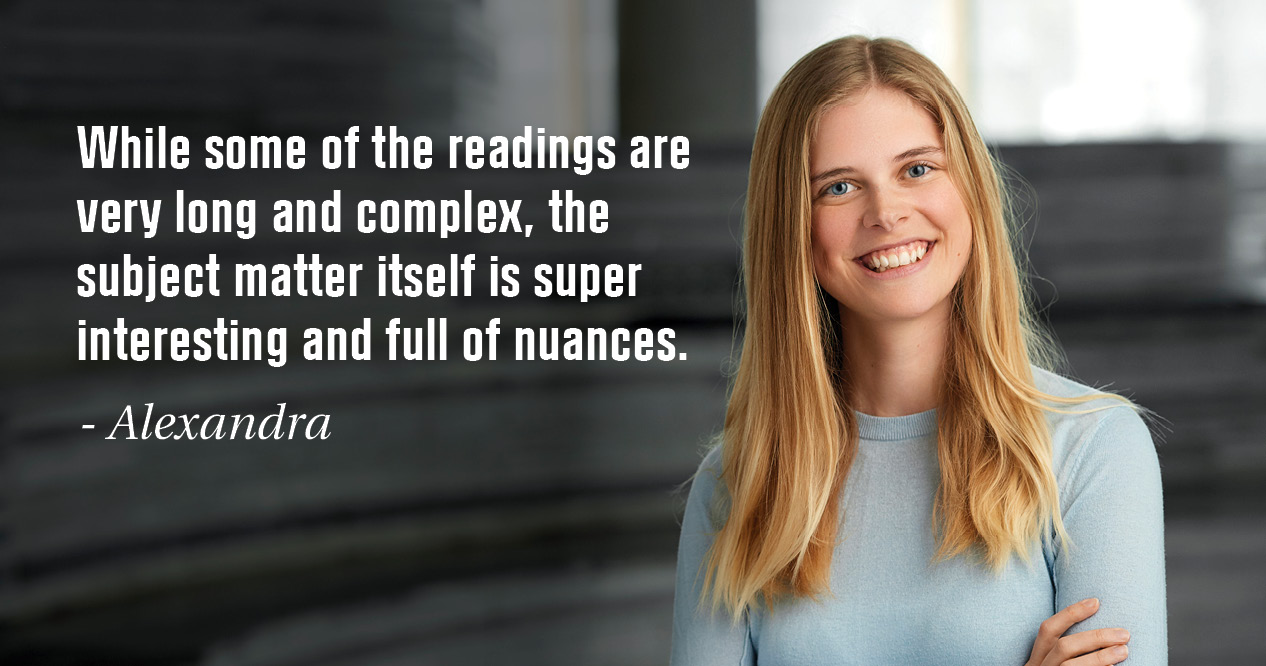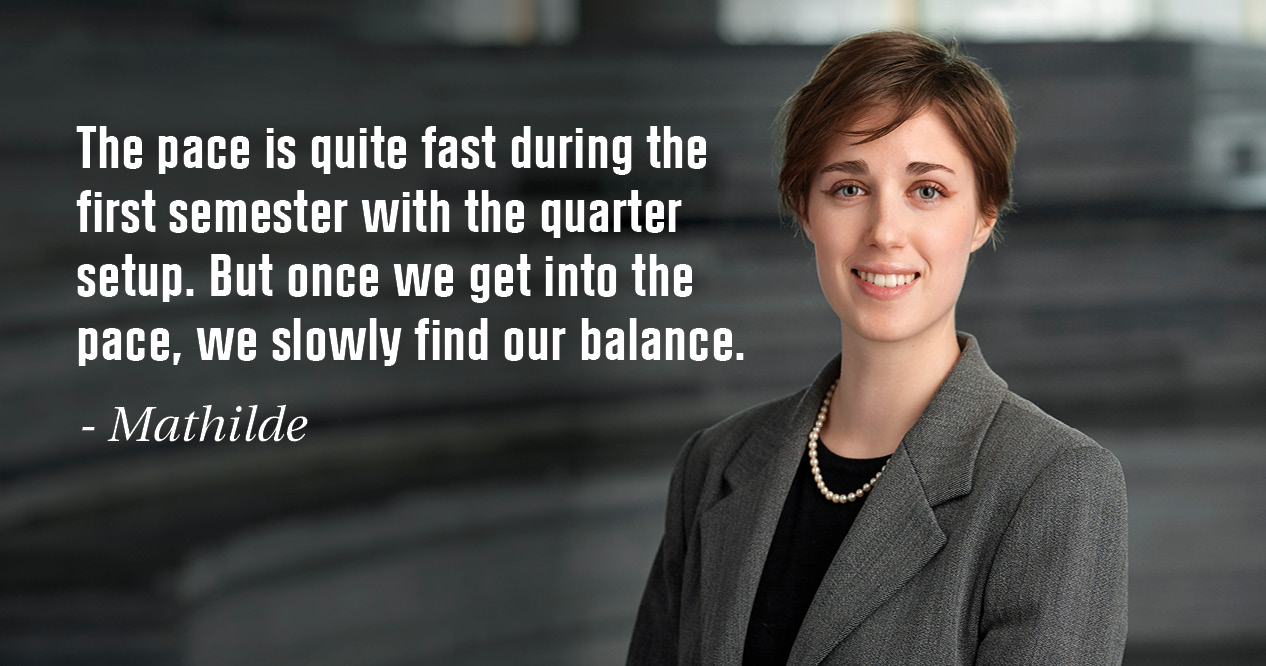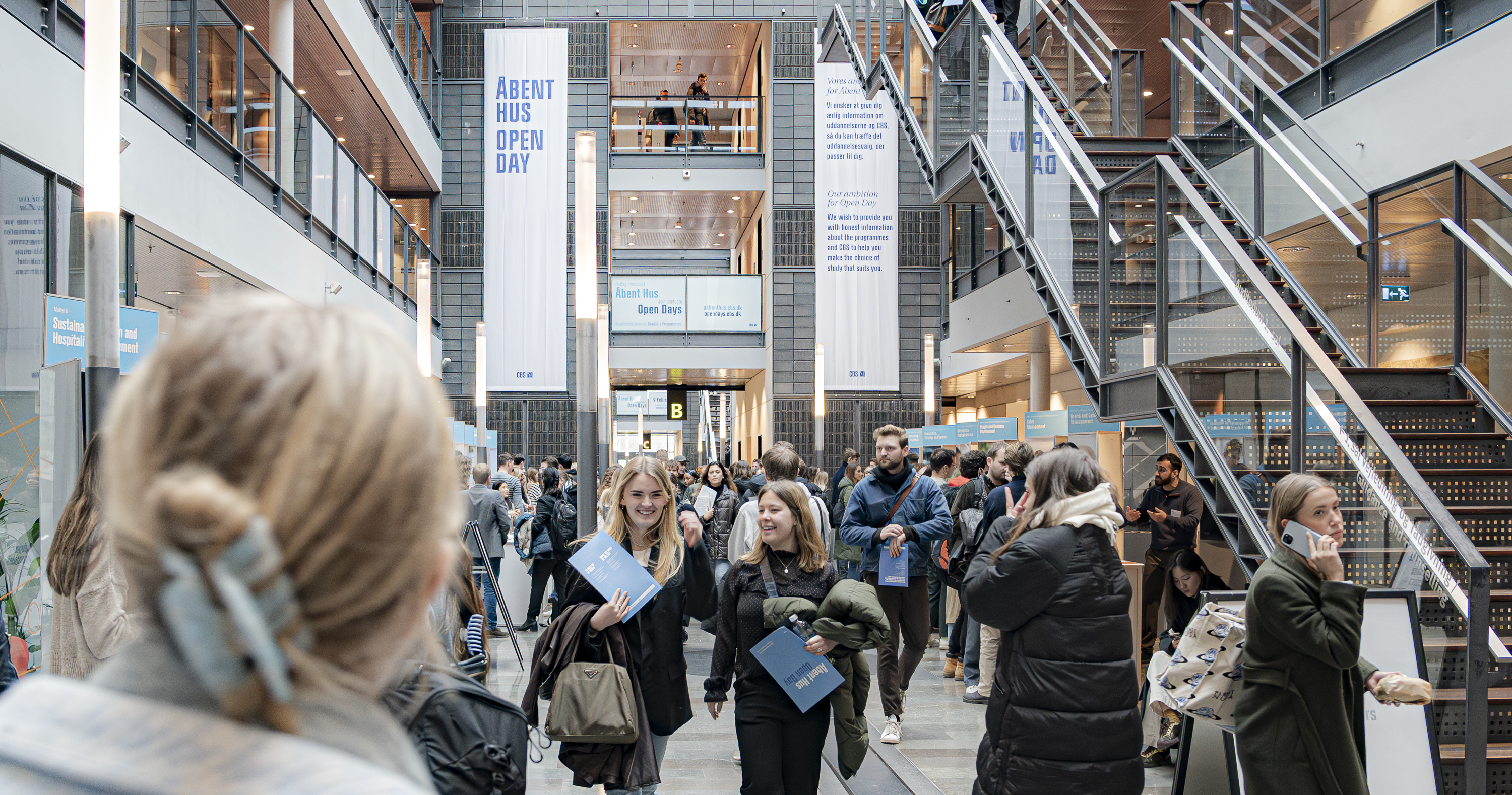MSc in Business, Language and Culture - Diversity and Change Management
About MSc BLC
MSc in Business, Language and Culture consist of 2 concentrations:
- Business and Development Studies
- Diversity and Change Management
MSc BLC gives you a scientifically based set of interdisciplinary, analytical, and communicative skills and qualify you for a career in globally oriented companies, institutions and organizations, private and public.
Interdisciplinary approach
In MSc BLC, you will learn to investigate the theory and practice of international business and management from an interdisciplinary vantage point at the intersection of the social and human sciences, bringing together insights and methods from several academic fields:
- international business administration and economics
- social, political and culture studies
- language and area studies
This interdisciplinary approach allows for a broad perspective on business, taking into account how regionally embedded values, norms, practices and interests impact the ways in which organisations operate in and across multiple contexts in the global economy.
The interdisciplinary approach is increasingly relevant to understand business at the intersection of global and local forces in particular regional contexts. Such an understanding helps not only to overcome obstacles related to cultural, social, political and economic differences between regions, but also to further one’s capacity to see and use contextual differences as potential resources when doing business.
Diversity and Change Management
The complexity of modern organisations stems in large part from globalisation and diversity. This is at the very core of this programme that addresses diversity and change in complex organizations.
DCM teaches you to manage and work with diversity as a concept overarching any activity of a modern organisation. On the basis of your knowledge within diversity, you are taught how to deal with different diversity issues that prove to be a challenge for modern organisations. It may be in the form of a multicultural workforce or a complex environment. You also gain management and leadership skills as a tool to handle diversity in an organisational context. This includes work in diverse teams, management of challenging projects and managing organisational change. Throughout the courses you will apply your knowledge on live cases, cases, games and projects.
Understanding complexity and change
Due to the complexity of modern organisations, DCM focuses on the management of diverse workforces and complex and diverse tasks, both inside and outside the organisation. This includes understanding local contexts and incorporating that knowledge internally in the organisation. An example is managing cultural complexity internally in the organisation, which stems from employing people with different nationalities.
DCM also prepares you to participate in leading, managing and organising activities in local cultural contexts on the basis of your cultural knowledge and project management skills. You learn to understand and gain knowledge from local contexts as well as to incorporate that knowledge internally in the organisation.
Language and culture
Next to your management courses you will explore and gain general knowledge within area studies while speaking your second foreign language. You will learn about political, cultural and social issues in the area where the language is spoken as well as gain knowledge on leadership and management in a regional context. This will enable you to operate in an international setting while taking different cultural and international differences into account. In this manner you add an extra and highly relevant perspective to the leadership and management practice and your cultural knowledge.

Customise your programme
During the programme, you have various opportunities to create your own academic profile.
Electives
On the 3rd semester, you can choose to study courses of your specific interest. CBS offers a large number of electives within a wide range of topics. You can also choose to take electives at other Danish universities. The electives you choose have to be relevant for your programme.
See the current selection of CBS electives on Single courses and electives - Master
Minor
On the 3rd semester, you can also choose to study a so-called minor. A minor is a package of electives within a specific academic area. Typically, it consists of 3 courses. By taking a minor, you strengthen your competences within a specific area of interest, and you can use it to qualify for specific jobs or industries.
See the current selection of CBS minors on Minors - Master
Exchange
Many students choose to go on exchange on their 3rd semester; usually at one of CBS’ more than 300 partner universities. When you go on exchange through CBS, you do not have to pay for the teaching at the foreign university (with a few exceptions), and you can bring your SU (student grant).
Find a list of all CBS partner universities here
Academic internship
In DCM, you can choose to replace some or all of your electives with a so-called academic internship. The academic internship consists of an internship period at a company, which is then completed with a project report. You can do the internship at a company in Denmark or abroad. The internship must have an international or intercultural scope, and the project report and work assignments have to be relevant to your study programme. When doing an internship you get the opportunity to relate theory to practice and reflect on the academic training you receive at CBS in a practical setting.
CEMS - Master in International Management programme
On DCM, you can apply for the CEMS - Master in International Management programme. CEMS MIM is a double degree programme, which gives you the opportunity to add a second degree in international management to you CBS degree. This means that you will get both the MSc degree and the CEMS in International Management degree.
CEMS is a 1-year programme, which you study in combination with your CBS degree in your 3rd and 4th semester. Part of it takes place at one of the other CEMS universities abroad.
Learn more about CEMS / Master in International Management
Double Degree with Smith School of Business
On DCM, you can apply for a double degree with Smith School of Business. As a double degree student, you obtain a degree from both CBS and Smith School of Business in the time it would take you to earn one degree. For the 1st year of your programme, you will study at CBS and for the 2nd year at Smith School of Business, Queens University, in Ontario, Canada. This way, you achieve a degree and a diploma from both CBS and Smith School of Business.
Learn more about Double Degree
Learn more about Double Degree with Smith School of Business
Master's thesis
Your 2nd year is completed with a master's thesis. You choose the topic you want to write about, which allows you to focus on a specific topic of your interest. Typically, you write your master's thesis with a fellow student.
What to consider
On DCM, you will improve your skills in a 2nd foreign language, learn more about different cultures and diversity and meet people from all around the world.
2nd foreign language
For some students the 2nd foreign language is a challenge. You will have courses in area studies taught in your 2nd foreign language. These courses deal with business, cultures and societies in regions in which the language is spoken. This means that you will read and discuss fairly complex academic texts in your 2nd foreign language.
Quarter and semester structure
Some of the courses are taught on a quarter basis. That means that you complete your courses within two month and the studies of these subjects are highly concentrated.
Cases and group work
In two courses you will work with a live case from the business society. The case work is done in groups which requires you to work together with your fellow students to find the best solution to the problems. It can both be challinging and time consuming but also very rewarding in terms of learning outcomes.
Studying in English
If you do not have bachelor’s degree taught in English, we recommend that you read more about what to consider before applying for an English taught programme.
Study environment
Students from many countries
DCM is one of the most international master programmes at CBS. Students come from many different countries and many students have different academic bachelor backgrounds. Around 40-50% of the students are from other countries around the world.
Multicultural and supportive environment
On DCM, you will study in a multicultural and multilingual environment. You will not only study cultures, diversity, complexity and languages, you will also experience it on a day to day basis as you interact with your fellow students and professors.
Students are generally very open-minded and supportive of each other. There is a supportive environment among the students who help each other and the multicultural environment offers great exposure to new ways of organising group work and solving problems. This will help prepare you for future work in international, complex and diverse organisations.
Student life at CBS
Studying at CBS is much more than just preparing for and going to classes.
At CBS, there are more than 20,000 students with different backgrounds and nationalities. Teamwork is an essential part of studying at CBS both in classes and in extracurricular activities.
With more than 100 student organisations, you also have plenty of opportunities to engage and connect with students across programmes and classes.
Learn more about the vibrant student life at CBS, the student organisations, and the international environment on Student life
For internationals
If you are an international student, we have gathered a lot of information about what it is like to be an international student at CBS and how you can prepare for life in Denmark.
Read more on For internationals
Studying at CBS is more than just preparing for classes. Learn about the student life at CBS, the countless student organisations you can join, and the international environment.
Read more about Student life
Teaching and exams
Teaching
The teaching in DCM has a strong focus on mixing theoretical learning with practice. The theories are applied in case discussions, live cases and mini-projects. Many of the professors come from other countries than Denmark, which contributes further to the multicultural environment in the programme.
Read more about Teaching and working methods on Student life
Exams
Each course is concluded with an exam. This means that you will have exams after each quarter and semester.
The exam types in DCM are a mix of the exam types offered at CBS in general. This includes written exam, take home exams and oral exams. We also have group exams as well as individual exams.
Read more about Exams and exams types on Student life
What gets you the job?
In DCM you will get a broad base of generalist knowledge and a versatile skill set to prepare you to work on the edge of local and global contexts characterized by complexity and change.
The programme gives you the theoretical and practical skills:
- to perform collaborative work in diverse teams
- to lead and manage challenging projects
- to provide consulting and analysis of strategic opportunities
- to participate in the leading and managing of organizational change
Career opportunities
DCM graduates will likely develop careers in different industries and contexts as:
- consultants
- project managers
- administrators
- line managers
They are just as likely to work in small and medium sized organisations as in large companies, and are equally likely to find non-profit or public sector work.
Job responsibilities could include:
- planning and executing projects
- leading and integrating employees from diverse settings into the workplace
- undertaking assignments in diverse international contexts
- participating in change projects or other HR initiatives
- providing market and customer analysis, business plans and marketing proposals.
Competence profile
In the competence profile you can find more information about the various competences you achieve in the programme:
Course overview
|
1st semester |
2nd semester |
3rd semester |
4th semester |
|
|
1st quarter |
2nd quarter |
Managing Organizational Change: Perspectives on Theory and Practice (7,5 ECTS) |
Electives / Internship / Exchange / CEMS (30 ECTS)
|
|
|
Diversity Management - Diversity, Gender and Equality in Organizations (7,5 ECTS) |
||||
|
Regional track course* (7,5 ECTS)
|
||||
|
Regional track courses with language* (7,5 ECTS)
|
||||
You can read more about the programme, academic content and exams in the programme regulations for MSc in Business Language and Culture
Track courses
You must choose one of the following courses:
Regional track courses with language
The courses are taught in French, Spanish, German for students studying these languages, and in English for students with Chinese and Japanese.
Depending on your choice of language, you will study one of the following courses:
| Course | Language of choice | ECTS |
| Business and Social Responsibility in Francophone Countries | French | 7,5 ECTS |
| Business Strategies in Latin America and the Caribbean | Spanish | 7,5 ECTS |
| Business in a Changing World: German Perspectives | German | 7,5 ECTS |
| Institutions and Business Strategy in the Chinese Context | Chinese and Japanese | 7,5 ECTS |


